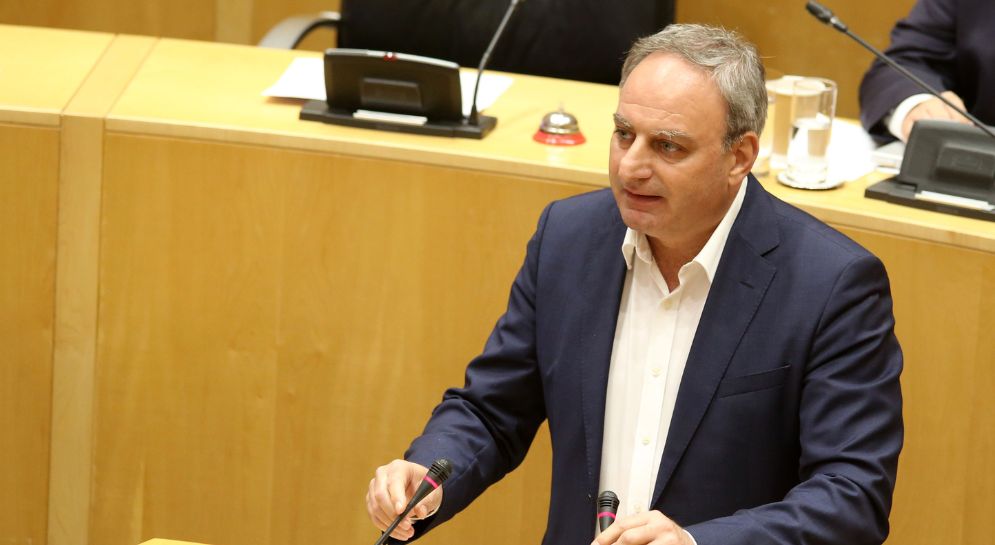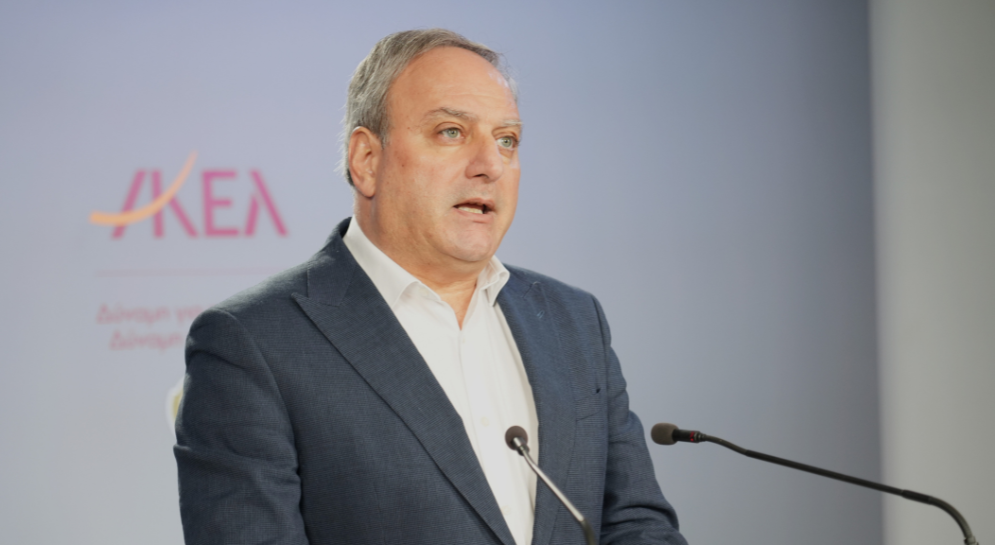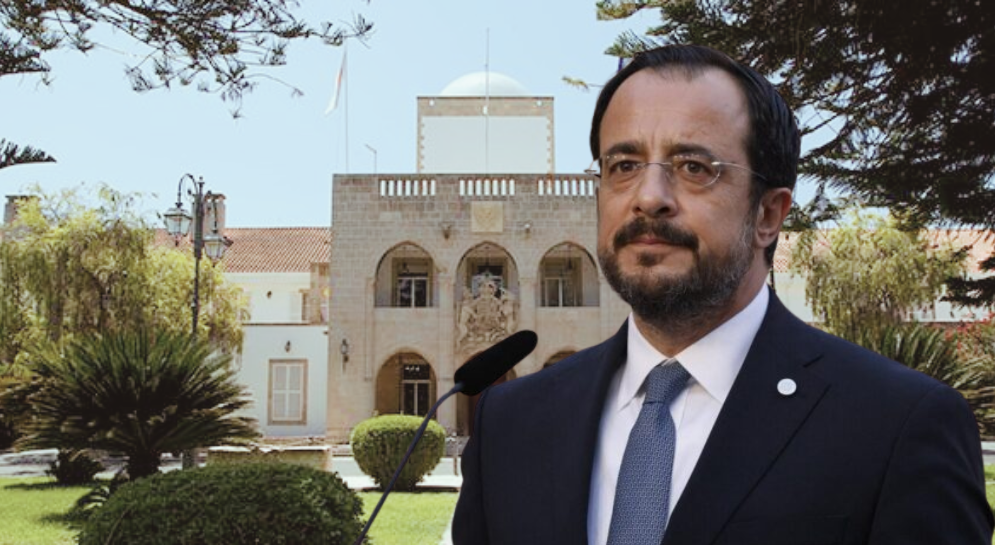
Interview with the General Secretary of the Central Committee of AKEL Stefanos Stefanou
A wind of optimism in AKEL in view of the upcoming elections
8 January 2024, “Gnomi” newspaper
HARAVGI: Comrade Stefanos, the introductory question is both formal, but also fundamental. 2023 was a year full of important events, both across the world and in Cyprus too. We would like you to tell us what remains as a “fermentation” for the New Year that has just begun…
STEFANOS STEFANOU: As far as AKEL is concerned, the fermentation involves us reconnecting with many people in society at large, on the occasion and focusing on the Presidential Elections in February 2023. This “reunion” began on the basis of a progressive political agenda that includes issues determining our country and people’s course. On the basis of this agenda aiming to make this reconnection with all these people assume a permanent character.
As for the Presidential Elections, we had from the very first moment expressed our hope that the President and his Government would prove us wrong in the predictions AKEL had made and prove worthy to the stakes and challenges before it.
Unfortunately, that didn’t happen, and not only did it not happen, but I must say that in the first ten or fifteen months of this administration, the President simply confirmed that his government would be a continuation of the previous DISY government. The Christodoulides government declares that it is continuing the policy of the Anastasiades government. Secondly, I must say that the whole governance, the behaviour and even the rhetoric of the current government has disappointed many of those who voted for N.Christodoulides.
HARAVGI: This year we will have European elections together with local elections. Is AKEL ready for this double political battle? How is the Party making use of the achievement – in quotes or not – of the presidential election result with the alliances and cooperation it had developed and the candidate it supported, Andreas Mavroyiannis, who got so close to being elected?
- STEFANOU: Starting from the latter, I would like to say that the Party’s ballots in municipal and community elections will include people who are outside and beyond the spectrum of AKEL, as well a lot of people with whom we worked together during the presidential election.
As far as our readiness is concerned, I must say that we are very advanced with our collective procedures, because in AKEL these procedures are collective. Let me say characteristically that the support of mayoral candidates or local community heads or the formation of the party’s ballot is decided at local electoral assemblies, or at Party branch assemblies, as far as the now amalgamated municipalities are concerned. So it isn’t a decision that is taken by the central leadership.
Of course the central leadership and leaderships of our district party organisations play a coordinating and political role, so we can have the best possible ballots that include those people who can actively help in the role that these councils perform, but at the same time to also ensure that we have ballots that are broadly representative of society and have good prospects to achieve a good electoral result.
We are optimistic based on the overall surrounding climate, a positive one, because of the good work we did in the elections. We are optimistic that we will have a good electoral result both in the local government and European elections that will record the path of growth that the party is on. At the same time however it will enable the party with its strong presence to be able to translate the trust that a large section of society has in our party for the benefit of society and the party in general.
We want a strong AKEL, so that its intervention is also strong for the benefit of working people, the common people, our society and Cyprus. The stronger AKEL is, the stronger we believe the hope for our country is.
HARAVGI: In relation to AKEL’s statutory congress, what were the most important changes that were approved and how in practice do they facilitate or help the Party’s leadership in its efforts to expand its stature, influence and forge alliances with the wider progressive society?
- STEFANOU: There were four or five things that were sought through the changes approved in the statutes. The first is the strengthening of the role of the party grassroots membership in the fermentation and decision-making procedures on various political issues, but also to upgrade the role of the party’s cadres in these decision-making processes. I can include the adoption of a quota regarding the presence of volunteer cadres in the party’s Central Committee. It is well known that we have decided to set a minimum base of 60%. By doing so, we can create more room for volunteer members, for people who can contribute on a daily basis with their work, their sweat and efforts to the party’s goal to transmit our policies and implement them.
Secondly, the election of the General Secretary of the Party directly by the regular Congress also enhances the role of party cadres. The other objective set was to strengthen the processes of renewal within the party.
At this point, I’d like to stress the reduction of terms in public office from three to two terms. This creates a dynamic generating more interest and people’s involvement in the party’s procedures and for its strong presence in important institutions such as Parliament, local authorities and in the European Parliament.
Thirdly, we decided to simplify both party structures and procedures so that we can work much faster, more collectively and smoothly in order to engage both the party as a whole and people who are close to the party and who look towards and hope for the party so they can participate in the various processes.
I believe these decisions will help us in that direction. What is certain is that these changes have left a very positive mark on both the party membership, the party’s electoral base and society at large.
HARAVGI: Citizens have become accustomed to hearing from AKEL’s leadership not only criticise the country’s erroneous state of affairs, but also submit specific proposals to address citizens’ problems. What were the most important proposals tabled by AKEL to provide relief to low-income citizens and the vulnerable groups of the population and what was the response of society and the government?
- STEFANOU: The situation in society is indeed disappointing. As far as AKEL’s proposals are concerned, the first category of issues we focused on are those concerning price increases and the great pressure that they are having on the majority of households and small and medium-sized businesses. We have submitted specific proposals firstly to facilitate households’ access to essential consumer goods.
Secondly, our proposals aim at reducing prices on basic consumer goods.
Thirdly, AKEL’s proposals seek to support household incomes and fourthly, we have put forward proposals on how the state can secure the necessary resources so that it has the financial capacity to adequately develop a policy that provides relief to society and small and medium-sized enterprises from poverty. This is one of the areas and the party’s effort was made in a very targeted way and by elaborating specific proposals.
The second category of issues are those that have to do with basic issues that concern society such as housing, but also issues affecting young families and young parents.
HARAVGI: Why did AKEL focus on these two important issues?
S.STEFANOU: Firstly because housing is a basic commodity and in recent years due to the sharp increase in the price of rents, but also the absence of a comprehensive government policy, housing is tending to become an elusive dream for many people, especially young people who want to acquire a home. That is why we felt it was necessary to organise a national campaign, during which we present specific proposals that we have elaborated, giving us the opportunity, in addition to promoting these proposals, to discuss them with those involved, interested and affected by the housing issue, about the various categories of housing, because housing also concerns young couples, young families, refugees and students.
We wanted to cover all of these issues and cover the question of the provision of housing, whether this is social housing or affordable housing. We sought to cover geographical areas, such as countryside, remote and disadvantaged areas, but also issues to do with funding in people’s efforts to acquire housing.
So through this campaign, we tabled specific proposals and had the opportunity to discuss with relevant Ministries, Departments and involved parties both in the public and private sectors. What we drew from this campaign has been very positive.
Specific proposals that we put forward were taken up by Ministries and relevant Services to take them forward. We opened up a discussion specifically on housing finance and how this could be done, which also created a momentum on such a very important issue.
The second area concerns young families and young parents. It affects essentially the biggest section of young people and the difficulties they face in trying to have children, ensuring childcare facilities and also the issue of state support for families.
There are serious shortcomings regarding the development of a comprehensive state policy that should encourage childbearing, having a family as a decisive measure to deal with the serious under-birth rate that exists in our country. These issues are also accompanied by very specific proposals in relation to various categories and sub-themes of this major issue affecting young parents. I must say that the tone and acceptance on the part of society has been very positive.
HARAVGI: Comrade Stefanos, on all of these issues and as you said before, referring to the price increases issue, the development of such programs also presupposes financial expenditures by the State. The concern is that workers and vulnerable groups of the population should not be loaded with burdens. Does AKEL have a proposal to diversify the State’s tax collection policy? Because today, thanks to the European Union, indirect taxes such as VAT, especially on goods and services, increase the Government’s revenues, but at the same time they reduce the incomes of the low and middle economic strata. Does AKEL have anything to propose that would diversify the source of State revenues in order to make tax policy fairer?
- STEFANOU: Yes, that is precisely why we are stressing the need for a new tax reform. The previous reform was in the 1980s, several years have elapsed since then. A lot of things have changed, so there needs to be a tax reform that corresponds to today’s conditions. Tax reform needs to have two characteristics:
The first characteristic is that there should be such a targeting applied that the pressure on the lower middle strata is cushioned and as we move further up the ladder of society, there should be more of a burden applied. So most of the state’s revenues must come from the high and not from low incomes. Therefore, this targeting should start from the lower strata of society and as we proceed upwards the various tax rates should vary upwards accordingly.
One characteristic of this tax reform concerns how in a rational and meaningful way we provide the necessary incentives so that entrepreneurship, especially small and medium-sized enterprises, which should constitute the backbone of the Cyprus economy and Cypriot businesses, is supported. There are major problems facing small and medium-sized enterprises and the State must see how it helps them survive, which, as we have said, are the backbone of the Cyprus economy.
You mentioned earlier, the increased revenues the State has accumulated. This is a fact. A basic position that we have outlined from the very beginning is that the State must return back to society a significant part of these increased revenues from the ongoing price increases. These are unexpected revenues for the State, as this was not even budgeted as price increases didn’t exist before. The State had budgeted certain specific revenues, it has received much more – both last year and this year too so far.
So the State must give back some of that money, especially in a targeted way, starting with those who are most in need and feeling squeezed by the expensiveness. Regrettably, we haven’t seen the present Government doing that, nor the previous one.
HARAVGI: Relatively recently, not so long ago, AKEL submitted proposals for a tax on wealth. Are these proposals linked to the issue of tax reform?
- STEFANOU: Yes, we are referring to these proposals, to the issues of high value property and wealth. It’s something that is being applied in other countries abroad. It’s something that is socially just too. When we talk about social policies we stress the need for targeted policies by starting from the lower strata of society. When we talk about taxation however, the talk revolves around less taxes, as that’s the neoliberal dogma the previous government applied and the current government pursues.
Less taxes serve those who primarily serve the rich, those on high incomes and high value property. To be very specific, when property taxes were abolished, the first to benefit were those who have and own high value property. Whereas our position is that this tax must be targeted. Namely, that a large proportion of households should be taxed on the property tax, that a normal house must not be taxed, that what all people have in real estate mustn’t be taxed, but instead as we go upwards high value property and large estates, of course should be taxed.
The previous government, by abolishing the property tax, in essence, removed tens of millions of revenues from the State and at the same time favoured the rich and the owners of high value property. So for taxation to be meaningful, to be socially just in this way, socially fair, it must be targeted.
HARAVGI: With the current composition of the government, with a President who is in political terms a continuation of the previous government, but with the participation of political parties that identify themselves as representing the “middle”/centre spectrum with perhaps different policies, do you see any grounds for such issues to come back to the level of Parliament with possible differentiations in positions?
- STEFANOU: We always try to create dynamics to change conditions, both inside and outside Parliament. Parliament is of course a very, very good springboard to promote policies, but let’s not forget that its role is constitutionally limited as far as the issue of it increasing expenditures is concerned.
Parliament cannot legislate increases in expenditure. If we could promote increases in expenditures, then we would have a greater ability to submit dynamic policies, but that is the government’s business, and that brings me to the important issue of electing a President.
In reality, it is the given President of the Republic who, to a large extent, together with his government, determines the course of the country and society, not Parliament. Parliament primarily exercises parliamentary scrutiny, engages in legislative work and in some cases can help towards formulating better conditions for socio-economic policies. That’s the role of Parliament.
As we are the main opposition we try very much in a creative way that you have referred to before to exercise our policy seeking to help society, the country and its economy. We shall continue to do so by trying to create the appropriate dynamics.
I must say that so far I cannot say that we are satisfied with the response of the other parties. We know the policy of DISY; unfortunately, we cannot say that we are satisfied with the parties that currently back the government either. The position these parties took, for example, on foreclosures is characteristic.
HARAVGI: And regarding the approval of the State Budget too…
- STEFANOU. We were surprised to see that parties that previously voted with us in cutting certain relevant funds have this year approved them. This doesn’t bode well for their stand towards society and the people. Regardless, we will continue our efforts and struggles both in and outside of Parliament.
AKEL’S RELATIONSHIP WITH SOCIAL MOVEMENTS
HARAVGI: To what extent is the AKEL leadership promoting cooperation with broader social movements that have sprung up in the country in many areas, on the environment, public health protection and on many other issues?
- STEFANOU: It is a very important part of our broader activity and activity we are developing as a Party and more generally as a movement to assist with our own participation without seeking to “dominate” them, without acting paternalistically in these movements aiming to strengthen their actions and help attain goals, either on the environment, housing, or price increases, or even in combatting fascism, the far right and nationalism.
We support these movements, encourage them with the authority and strength that we have. We try to make these movements stronger, to enhance their voice and through their actions to achieve specific objectives, progressive objectives for the benefit of society. This work is an important part of our overall struggle, we are active in them and will continue our actions.
HARAVGI: Let’s turn to the Cyprus problem. With the New Year, do you see any good prospects for the Cyprus problem? With the appointment of María Ángela Holguín Cuéllar as the UN Secretary General’s envoy on Cyprus, do you as AKEL believe that there are prospects to break the longest stalemate recorded surrounding the Cyprus problem?
- STEFANOU: Firstly, the appointment of the UN Secretary General’s envoy is a positive development, as the envoy will dedicate herself to the effort to break the deadlock and resume the negotiations. That is the principal objective.
Secondly, the appointment on its own doesn’t necessarily mean that there will be developments on the Cyprus problem. We must bear this in mind. The conditions are difficult, as Turkey and the Turkish Cypriot leadership are adopting a negative stand. They are sometimes even provocative on the Cyprus problem.
There are problems in our region and the world that are distracting the international community. I’m talking about the war in Ukraine and the war Israel is waging in the Middle East, in the Gaza Strip and recently in the West Bank too. You can see that the international community is focusing in this direction.
However, that doesn’t mean that this should lead us either to apathy or to accept the stagnation and deadlock that we have on the Cyprus problem.
Our duty must be to take specific and targeted initiatives to create a dynamic for the resumption of negotiations. We have said many times how we think this should be done.
The first thing that needs to be done on our part, on the part of the Republic of Cyprus, is to keep reiterating our position that we continue to remain consistent to the agreed basis for a solution of a bicommunal, bizonal federation with political equality, as outlined in the relevant Resolutions of the United Nations.
This has been and remains our consistent and long-standing position. The strength of this position has been demonstrated by the fact that the Turkish side has now officially moved from the position of supporting a bizonal, bicommunal federation to the position in favour of a two state solution.
For that reason we must, without any footnotes or hesitation, take a clear stand on this position.
HARAVGI: Is the current government doing this, bearing in mind the political baggage it has with the contrasting forces that are participating in the Nikos Christodoulides government?
- STEFANOU. The government isn’t doing so with consistency. From time to time it refers to this position, but not always and neither is it doing so with the consistency we would like.
The second thing that the government must do is again, without any hesitation, footnotes and ambiguities, to declare that it is ready to continue negotiations from the point at which the negotiations were suspended in 2017 at Crans Montana, preserving the convergences achieved and recorded by the UN Secretary General in his September 2017 Report. It must declare that we are ready to continue negotiations on the basis of the Guterres Framework.
We aren’t satisfied either with the positions that the government is taking as it avoids on many occasions to refer to the convergences recorded and the Guterres Framework, obviously because of internal problems it has with the positions and approaches of the parties that back the government. There is no other way forward though.
Either we take a clear position on this issue on which the international community has adopted a position, or through our ambiguities we will continue to fuel the Greek Cypriot side’s lack of credibility and the international community’s doubt whether the government has the necessary political will to take a new initiative that will lead to breaking the deadlock and resuming the negotiations.
The third thing we need to do is to give a practical meaning and content to the positive agenda that the President of the Republic was talking about at the beginning, but no longer refers to. The positive agenda must address Turkey and the Turkish Cypriot leadership in an effort to unleash incentives and well-intentioned interests to bring the Turkish side back to the negotiating table.
When the President spoke of a positive agenda, he put Euro-Turkish issues in that context. We have of course said from the very outset that the European environment and issues are an important subject, but these alone are not themselves capable of unleashing dynamics that will lead to breaking the deadlocks on the Cyprus problem.
In AKEL’s view, the strong card of a positive agenda is energy developments in our region and in Cyprus.
We have submitted a concrete proposal since December 2020 on how this factor can be made use of without violating our “red lines”, for unleashing dynamics seeking to break the deadlock. Unfortunately, the President’s attitude and position is the same as the previous government. He doesn’t include energy in the positive agenda and so we don’t have what we could have had as to the desired objective of resuming the negotiations.
We note that the developments in Ukraine and more broadly on energy issues and the ongoing existing energy crisis, further validates the importance of energy developments in the region.
Secondly, I must say that the statements made both by the Turkish Foreign Minister, Mr. Fidal, and the Turkish President, Mr. Erdogan, show that energy is an issue that is of interest to Turkey. So here is a glorious opportunity!
The question is how we make use of these issues without going beyond any “red lines” to enable us to achieve the desired goal of continuing the negotiations.

Secretary




